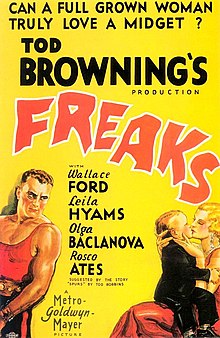Disability in horror films
Horror films have frequently featured disability, dating to the genre's earliest origins in the 1930s.
[8] Tod Browning's Freaks (1932) has been highlighted as a notable example of a horror film for prominently depicting disability, and has received diverse commentary for its depiction of the community, with some labelling it as portraying disability sympathetic and anti-eugenicist and others criticising it for being exploitative.
[3] In the 21st century, some commentators noted a trend of horror films depicting deafness in a perceivedly fetishistic manner, including A Quiet Place and The Unholy.
[8] Lupita Nyong'o's performance in the 2019 film Us was criticized by disability rights groups for being inspired by symptoms of spasmodic dysphonia.
[11][12] In an open letter to M. Night Shyamalan, disability activists wrote that "Split represents yet another gross parody of us based on fear, ignorance, and sensationalism, only much worse.
